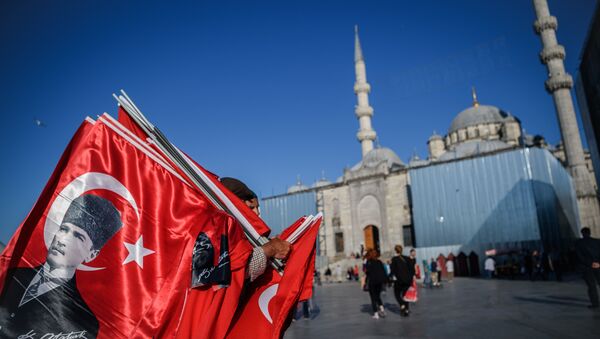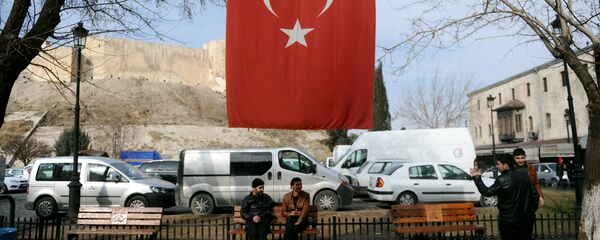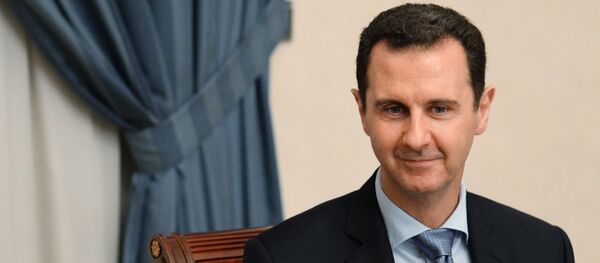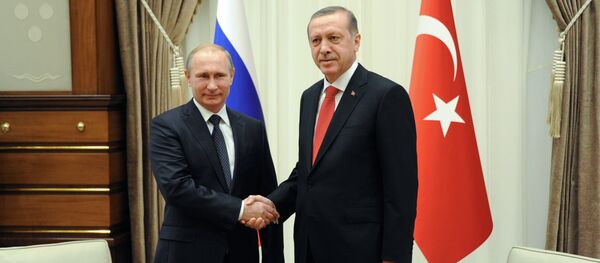On July 13 Turkish Prime Minister Binali Yildirim said that Ankara will eventually normalize its relations with Syria and vowed to "expand the circle of friendship" outside Turkey.
"We will expand the circle of friendship as far as possible. This is our aim. We will expand the circle of friendship inside and outside the country. We have already begun to do this. We have returned our relations with Israel and Russia to normal. I am sure that we will return to normal relations with Syria as well. We need that. Syria and Iraq need to reach stability for success in the fight against terror," Yildirim said at a Justice and Development Party (AKP) summit in Ankara, as quoted by the Hurriyet Daily News.
Commenting on the issue Atilla Sandikli, head of the Center for Strategic Studies BILGESAM, told Sputnik that Ankara has realized that its policy of coercion toward Syria had proven ineffective.
However, the expert hinted at the fact that while the Turkish leadership has decided to change its stance on the Syrian conflict, "it has not completely abandoned" its position on Bashar al-Assad.
"It is for sure that something needs to change in Syria but above all al-Assad must go first. Without al-Assad changing, nothing will change in Turkey. The main reason things have come to this point is because of al-Assad," Yildirim told BBC's Hardtalk, as quoted by the Hurriyet.
Yildirim's words prompted Turkish journalist Hilal Kaplan of Daily Sabah to suggest that "there is no change in Ankara's perspective on Assad."
Furthermore, citing an unnamed senior Turkish official Kaplan reported that discussions about "post-Assad transition process" are going on in Ankara.
It seems that Ankara has adopted a double-edged position toward Syria.
"I want to draw your attention to the fact that [after the pledge to normalize relations with Syria] additional clarifications have been voiced that Yildirim didn't mean mending the bilateral relations with Bashar al-Assad preserving his presidency," Kosachev underscored.
"At the same time [Ankara's move] means a [new] vector and, undoubtedly, a change in rhetoric. It represents a chance of Turkey's more careful approach toward Russia's position on Syria as well as that of other countries which do not "bet" on immediate regime change [in Syria]. It is a distinct shift, but not a categorical one and it does not allow us to assume an ultimate rapprochement of Turkey and Russia's positions on this issue," Kosachev stressed.
As for the thaw between Turkey and Russia, the politician remarked that Ankara and Moscow are "at the very beginning of the journey" and warned against overestimating the consequences of the Russo-Turkish normalization in regard to the ongoing Syrian crisis.
Russian Duma Foreign Affairs Committee chairman Alexei Pushkov shared a similar cautious stance in regard to Turkey's Syrian policy.
"Some shifts have begun to take effect in Turkey's position on Syria, but they have not yet led to any qualitative changes. [What we see] is correcting of approach. I believe that, on the one hand, it is prompted by the fact that [the Turkish leadership] has realized the threat posed by Daesh. On the other hand, if Turkey does not normalize its relations with Syria it may face difficulties with resolving the Kurdish problem," Pushkov told Izvestia.ru.
"It will be really hard for Turkey to change its stance [on the Syrian president], since it has been insisting that Assad should step down for a very long time. However, there apparently appears an understanding that bilateral contacts [with Damascus] on issues Turkey is interested in are necessary," Pushkov suggested.
Kadri Gursel, a columnist for Al-Monitor's Turkey Pulse and Turkish Cumhuriyet opposition newspaper, sounded more categorical.
"There is no indication to suggest that a fundamental policy change is under way… In sum, Erdogan is not changing his foreign policy — he is resetting it," Gursel writes in his article for Al-Monitor.
"For a true normalization, an explicit and fundamental revision in Turkey's Syria policy is a must, including an unequivocal end to Turkish support for jihadi groups, the restoration of border control and an unconditional struggle against the Islamic State [Daesh]," the Turkish journalist stresses.




